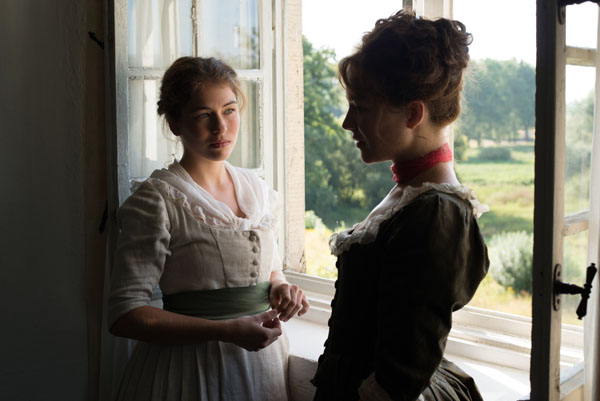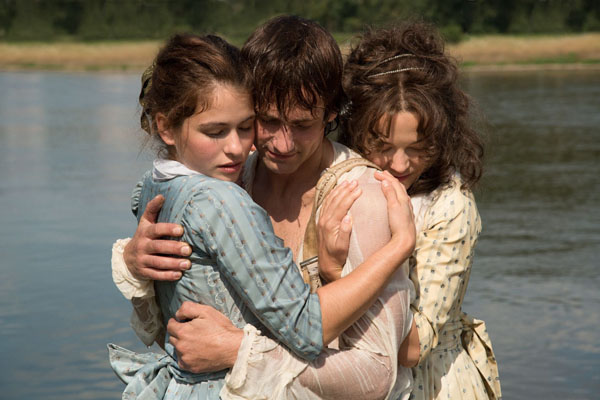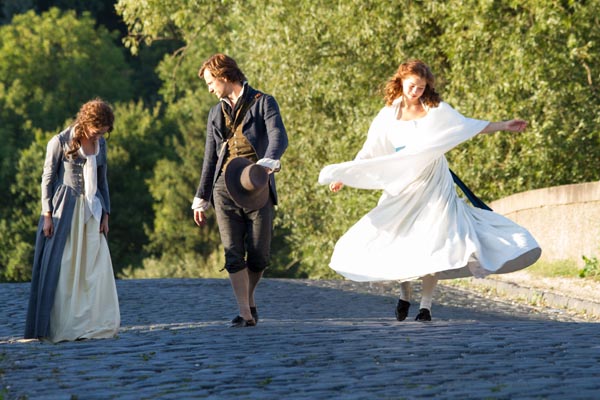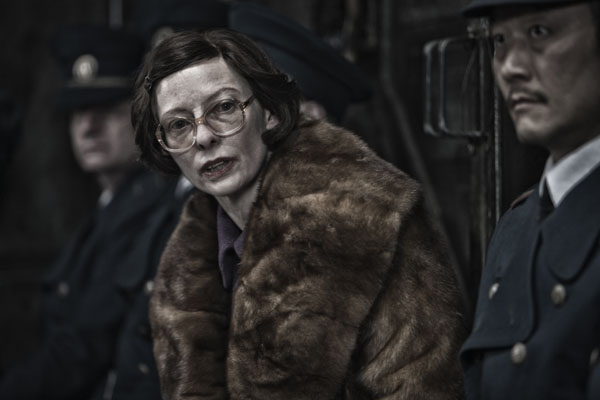Not even the 39 credits as a director at the IMDb do justice to the sheer magnitude of Dominik Graf‘s output. Behind one of those credits, for example, is a ten-episode television series, Im Angesicht des Verbrechens (2010), a daring, sprawling thriller about the Russian mafia in Berlin. He’s won dozens of prestigious awards for his work in both film and television, and you’ll find them listed, along with a decent biography and several links to articles and interviews, at Wikipedia—in German. As for the English version of that page, it’s practically blank—as clear an indication as any of a severe oversight.
In 2011, at least a handful of cinephiles outside of Germany became aware of Graf when he contributed a feature to the Dreileben trilogy (the other two came from Christoph Hochhäusler and Christian Petzold), which screened at that year’s New York Film Festival. His international reputation was boosted a notch higher last year with retrospectives in Rotterdam and Vienna. And just a couple of weeks ago, the Ferroni Brigade, the prime movers behind those retrospectives, wrote about an episode of Tatort, a wildly popular Sunday night detective series in Germany, noting that “Graf wastes no time in establishing a tone that is breathless even by his own standards.” Indeed, with its rapid cuts, zooms and swerves, its wildly unconventional camera placement and framing, the episode came off almost like an experiment intended to determine just how much distraction family viewers could handle before they lose their bearings altogether, in terms of both geographical space and the narrative.
Graf pulls way, way back from all that in Beloved Sisters (Die geliebten Schwestern), the tale—and it is a tale, not stone cold history—of the unhappily married Caroline von Beulwitz (Hannah Herzsprung) and her slightly more timid sister Charlotte von Lengefeld (Henriette Confurius) who, in the summer of 1788, both fall in love with none other than Friedrich Schiller (Florian Stetter). And it only strengthens their sisterly bond. Charlotte is supposed to lure a husband that’ll save her family from financial ruin, so communication between Schiller, not yet a professor, still a dirt poor poet and philosopher, and Caroline and Charlotte must be clandestine. Many—many!—encoded letters race on horseback to and fro, and eventually, the three come to, shall we say, an understanding. What’s genuinely astounding is how well and how long the arrangement lasts (the film itself is 170 minutes, though it never feels long; more on that below).
Running parallel to the all but inevitable dissolution of the ideal of the ménage à trois and pretty much right next door is, of course, the French Revolution, followed by the Reign of Terror. Returning with stories and drawings of the bloody anarchy in France, Schiller’s close friend (and ultimately Caroline’s husband) Wilhelm von Wolzogen (Ronald Zehrfeld) argues that he, Schiller and all the other writers in their circle (most famously gathered between covers in the literary journal Die Horen) calling for a shakeup of the old order should have seen this coming—a realization that echoes at home.
In the beginning, when all is still well and full of hope, Graf’s camera is steady and stately and Michael Weisweg’s cinematography is a conscious rendering of the painting of the era. Once emotions begin to flare, the frame subtly slides off kilter, there are unexpected fades to portraits of characters looking directly into the camera, relatively quick fades elsewhere as well, and even in quiet moments, compositions suggest that all is not quite right. Beloved Sisters is a melodramatic and moving film, and should a U.S. distributor pick it up (and one should!), cinephiles in America and broad will finally be hearing and reading more about Dominik Graf, maybe even at Wikipedia.
WHAT OTHERS ARE SAYING
“Graf has created an unusually intelligent costume drama of bold personalities torn between the stirrings of the heart and the logic of the mind, while casting his revealing gaze upon Western Europe’s bumpy transition from the 18th to 19th century,” writes Variety‘s Scott Foundas. “Graf’s film is, on one level, a familiar tale of star-crossed lovers held apart by time, tide and the pestilent social climate of the era. But at every step, the filmmaker, who has an exceptionally acute sense of the relationship between the personal and the political, uses the push and pull of the characters as a window onto the unraveling social fabric of bourgeois European society.”
“Like many expensive German period films,” notes Boyd van Hoeij in the Hollywood Reporter, “Beloved Sisters was mounted as an ‘amphibian’ project with both a theatrical release and a longer TV version in mind, which gives the filmmakers access to much-needed small-screen funding. The version shown in competition in Berlin is the 170-minute ‘festival version,’ though a 140-minute theatrical version, which will be released locally in July, and a 190-minute, two-part miniseries also exist.” Boyd finds that it “plays like a soap opera in which the characters just happen to have better manners and finery.”
“Bright Star or Immortal Beloved may be the parallels, but Beloved Sisters is a little more remote than even those literary screen romances,” finds Fionnuala Halligan, writing for Screen.
Updates, 2/23: “Beloved Sisters unfolds as this innocent, pure, overlapping love contradicts itself due to marriage, money, and social status,” writes Adam Cook in the Notebook. “While there is something tragic about how these feelings must be repressed and formed according to circumstance, the film does not rule out the potential to love more than one person simultaneously. Rather, it suggests that these people may have been able to love openly and successfully were it not for the boundaries of their lives and social constrictions.”
For Bénédicte Prot, writing at Cineuropa, while “Beloved Sisters does not do anything in particular to reinvent the period fictional biography genre, it does have some interesting features—above all, the importance given to text itself: beyond the epistolary origins that largely shape the story (reading features heavily, either on-screen or via voice-over, as do the characters’ exchanging of letters and the recurring image of the quill dancing gracefully over the paper), there are also quite a lot of coded messages about the advances in the printing industry—which lead Schiller to dream of a future in which everyone will have access to books—and about the popularity of serialized novels.”
Variety‘s Leo Barraclough reports that Music Box has picked up rights for the U.S. and Canada, while Curious has taken rights for Australia and New Zealand.
I’ve gone long on Beloved Sisters (and I don’t regret it for a moment), so let me offer here a few quick notes on two films that you’ll have likely already heard about. For starters, I don’t understand all the praise for Bong Joon-ho’s Snowpiercer, and I say that as an admirer of Memories of Murder (2003) and The Host (2006). Even given that it’s an adaptation of a graphic novel (Le Transperceneige), must every character be stock, every line written in a speech balloon, every parallel between each car on the train and its corresponding social level and function be so obvious? That aside, does the project really call for such clunky filmmaking?
Not to give anything away, but when its discovered what it is that the lowest level of this society on wheels and tracks has been eating for years, pull your head out of the story for a moment (trust me, it won’t be hard), take a look, and ask yourself, Some of these shots here: do they even belong in the same film? All that said, though: Tilda Swinton. The entry on Snowpiercer hasn’t been updated in a while, but for a fresher appreciation, see Oggs Cruz, who posted a review about a week ago.
Updates, 2/21: “Snowpiercer will likely stand as the most disappointing film of the festival, if not the entire moviegoing year,” writes Adam Cook in the Notebook. “The Korean master’s first failure, it lacks his trademark qualities and in their place offers sardonic, overwrought allegory, and an absolute overdose of clashing absurdities.”
But for Giovanni Marchini Camia, dispatching to Film Comment, the “exhilarating action is coupled to an intricate and involving narrative peppered with both mordant humor and affecting pathos. Bong… expertly juggles beautifully executed, truly breathtaking fighting sequences, and detailed yet elegantly deployed exposition.”
“Unquestionably cluttered and meandering when viewed as a single chunk of storytelling, Snowpiercer nevertheless has the feel of a complex, inspired work in tune with its innovative milieu,” writes Indiewire‘s Eric Kohn.
I have a confession to make, I suppose. When To the Wonder opened over here, I skipped it. When I posted entries on the film and it came time to embed a trailer or a clip, I couldn’t bring myself—I could not physically bring myself—to watch them through to the end. For years, I’ve loved the work of Terrence Malick, but at some point during a second viewing of The Tree of Life, something snapped. In short, I am Malicked out. That’s the boulder of salt you’ll have to take with my few words here on The Better Angels.
It’s the Malick-produced feature debut of A.J. Edwards, co-cameraman on a doc about the making of The New World and second unit director and co-editor on To the Wonder and the forthcoming Knight of Cups. The Malick level in The Better Angels is turned down from eleven to around seven or eight, but the black-and-white imagery is still wispy, the soundtrack still whispery. Though we know we’re watching the story of Abraham Lincoln from around 1817 through 1819, when he would have been eight, nine, ten years old, he (Braydon Denney) is never, I believe (and I listened hard) called by name. This is Malickland, where the men are gruff and the women are angels. There’s even an echo of the “hit me” scene from The Tree of Life, though Jason Clarke’s father is a shade kinder than Brad Pitt’s.
The farm is worked, but there’s also an inordinate amount of aimlessly milling about in the fields and under sun-dappled trees, learning to whistle with a blade of grass and so on. When Abe’s mother Nancy (Brit Marling) dies, Tom Lincoln heads to Kentucky and returns with a new wife and mother, Sarah (Diane Kruger), and a few new siblings. Edwards understands that these aren’t the kind of folk who talk their problems through, but the family avoids addressing matters of substance to such a degree that, ultimately, this world Edwards has conjured, and all the people in it, seem terribly artificial.
Other opinions (and they vary wildly): Todd McCarthy (Hollywood Reporter), Noel Murray (Dissolve), Rodrigo Perez (Playlist, D+), Jordan M. Smith (Ioncinema, 4.5/5) and Kim Voynar (Movie City News). Interviews with Edwards: Carlos Aguilar (Indiewire) and Jordan Raup (Film Stage) and EW (3’37”) and THR (2’28”).
Update, 2/23: Kaleem Aftab interviews Edwards for Filmmaker.
For news and tips throughout the day every day, follow @KeyframeDaily on Twitter and/or the RSS feed. Get Keyframe Daily in your inbox by signing in at fandor.com/daily.







